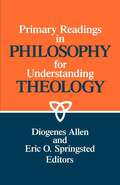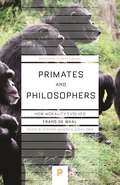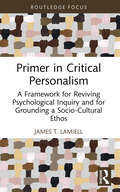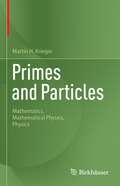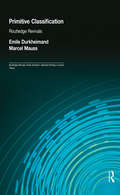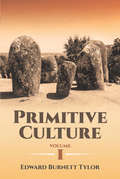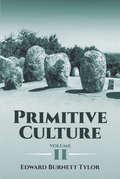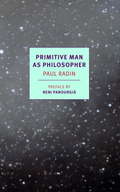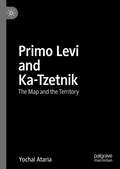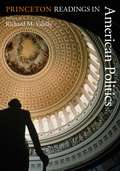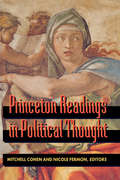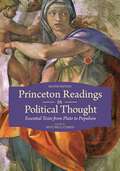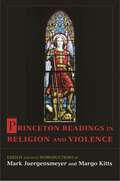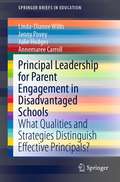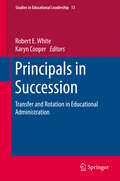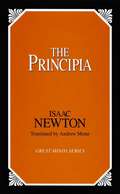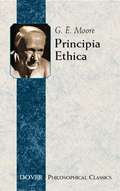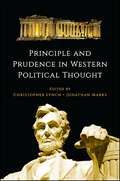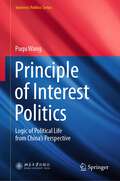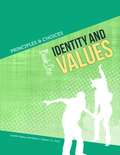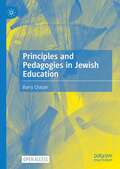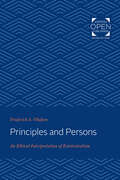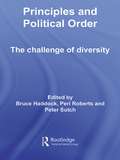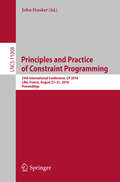- Table View
- List View
Primary Readings in Philosophy for Understanding Theology
by Diogenes Allen Eric O. SpringstedKnowledge of key philosophic terms or concepts is vital to the understanding of many issues in Christian theology. Diogenes Allen's book Philosophy for Understanding Theology explores such terms and concepts and their relationship to theology. This new anthology, edited by Allen and Eric Springsted, provides primary texts undergirding that earlier work. The writings included here deal with philosophical issues crucial to the understanding of theology and include responses to those questions from Plato to the present. Whether used alone or as a companion volume, this new reader is a valuable resource for theological studies.
Primates and Philosophers: How Morality Evolved (Princeton Science Library #43)
by Frans de WaalCan virtuous behavior be explained by nature, and not by human rational choice? "It's the animal in us," we often hear when we've been bad. But why not when we're good? Primates and Philosophers tackles this question by exploring the biological foundations of one of humanity's most valued traits: morality. In this provocative book, renowned primatologist Frans de Waal argues that modern-day evolutionary biology takes far too dim a view of the natural world, emphasizing our "selfish" genes and reinforcing our habit of labeling ethical behavior as humane and the less civilized as animalistic. Seeking the origin of human morality not in evolution but in human culture, science insists that we are moral by choice, not by nature. Citing remarkable evidence based on his extensive research of primate behavior, de Waal attacks "Veneer Theory," which posits morality as a thin overlay on an otherwise nasty nature. He explains how we evolved from a long line of animals that care for the weak and build cooperation with reciprocal transactions. Drawing on Darwin, recent scientific advances, and his extensive research of primate behavior, de Waal demonstrates a strong continuity between human and animal behavior. He probes issues such as anthropomorphism and human responsibilities toward animals. His compelling account of how human morality evolved out of mammalian society will fascinate anyone who has ever wondered about the origins and reach of human goodness. Based on the Tanner Lectures de Waal delivered at Princeton University's Center for Human Values in 2004, Primates and Philosophers includes responses by the philosophers Peter Singer, Christine M. Korsgaard, and Philip Kitcher and the science writer Robert Wright. They press de Waal to clarify the differences between humans and other animals, yielding a lively debate that will fascinate all those who wonder about the origins and reach of human goodness.
Primer in Critical Personalism: A Framework for Reviving Psychological Inquiry and for Grounding a Socio-Cultural Ethos (ISSN)
by James T. LamiellThis insightful book offers contemporary psychologists and other social theorists an understanding of the comprehensive system of thought developed by the German scholar William Stern (1871–1938) known as critical personalism.Expanding the author’s ongoing efforts in this area, the book considers, firstly, how critical personalism could ground a needed revival of psychological science, a need created by the field's gradual transformation, through its widespread adoption of aggregate statistical methods of investigation, into a discipline better characterized as 'psycho-demography.' Consistent with Stern's own view of the potential of critical personalism vis-a-vis socio-ethical concerns, the book then explores how the framework could facilitate a transcendence of thinking about racial and other social relationships beyond currently prevailing narratives about personkinds into narratives that are actually about persons. This part of the book includes a chapter discussing Stern's own historical efforts in this direction, serving to highlight the non-individualistic nature of critically personalistic thinking. Throughout, Lamiell constructs a clear case for the merits and applicability of critical personalism in modern psychology and social thought.Primer in Critical Personalism will interest established psychological scientists and advanced students in the field, as well as those who are concerned about our contemporary socio-cultural ethos and the prospects for its improvement, including philosophers, sociologists, educators, journalists, clerics, and thoughtful laypersons alike.
Primes and Particles: Mathematics, Mathematical Physics, Physics
by Martin H. KriegerMany philosophers, physicists, and mathematicians have wondered about the remarkable relationship between mathematics with its abstract, pure, independent structures on one side, and the wilderness of natural phenomena on the other. Famously, Wigner found the "effectiveness" of mathematics in defining and supporting physical theories to be unreasonable, for how incredibly well it worked. Why, in fact, should these mathematical structures be so well-fitting, and even heuristic in the scientific exploration and discovery of nature? This book argues that the effectiveness of mathematics in physics is reasonable. The author builds on useful analogies of prime numbers and elementary particles, elementary structure kinship and the structure of systems of particles, spectra and symmetries, and for example, mathematical limits and physical situations. The two-dimensional Ising model of a permanent magnet and the proofs of the stability of everyday matter exemplify such effectiveness, and the power of rigorous mathematical physics. Newton is our original model, with Galileo earlier suggesting that mathematics is the language of Nature.
Primitive Classification (Routledge Revivals: Emile Durkheim: Selected Writings in Social Theory)
by Emile Durkheim Marcel MaussIn this influential work, first published in English in 1963, Durkheim and Mauss claim that the individual mind is capable of classification and they seek the origin of the ‘classificatory function’ in society. On the basis of an intensive examination of forms and principles of symbolic classification reported from the Australian aborigines, the Zuñi and traditional China, they try to establish a formal correspondence between social and symbolic classification. From this they argue that the mode of classification is determined by the form of society and that the notions of space, time, hierarchy, number, class and other such cognitive categories are products of society. Dr Needham’s introduction assesses the validity of Durkhiem and Mauss’s argument, traces its continued influence in various disciplines, and indicates its analytical value for future researches in social anthropology.
Primitive Culture Volume I
by Edward Burnett TylorUse of the term "culture" as an expression of the full range of learned human behavior patterns began with this classic two-volume work, first published in 1871. Edward B. Tylor, the first Professor of Anthropology at the University of Oxford, declared that culture is "that complex whole which includes knowledge, belief, art, law, morals, custom, and any other capabilities and habits acquired by man as a member of society." Tylor is credited with the establishment of anthropology as a scientific discipline, and his groundbreaking work was highly influential in the development of cultural evolution as the foundation for anthropologic studies. Tylor's unilinear model of development maintains that humans share a common history, evolving from a single primitive form. His studies of the languages, rituals, and beliefs of societies from around the world pioneered the use of statistical data and substantiated his view of a universal pattern of development in all cultures. Volume I of Primitive Culture focuses on social evolution, language, and myth. Volume II focuses on Tylor's interpretation of animism in society, offering details of the endlessly varied ideas and beliefs regarding the soul, spirits, and gods.
Primitive Culture, Volume II: Researches Into The Development Of Mythology, Philosophy, Religion, Art, And Custom, Volume 2 - Primary Source Edition (Cambridge Library Collection - Anthropology)
by Edward Burnett TylorThe first Professor of Anthropology at the University of Oxford, Edward B. Tylor, defined the term "culture" for modern readers in this groundbreaking work. Initially published in 1871, this classic two-volume study explores the full range of learned human behavior patterns in terms of the beliefs, wisdom, laws, artistic achievements, and mores that constitute a society. The formation of anthropology as a scientific discipline began with this work, which continues to exercise a profound influence on anthropologic studies. The shared history of all humans, a common ground that evolved from primitive roots, constitutes the basis for Tylor's model of development. Drawing upon a worldwide variety of beliefs, rituals, and languages, the author illustrates an all-inclusive pattern of progress. His methods inaugurated the use of statistical data in anthropology, a standard procedure today but a landmark for his time. Volume I of Primitive Culture examines social evolution, language, and myth. The focus of this second volume is animism in society, which explores the tremendous diversity of thinking related to the concepts of the soul and religion as well as the marked similarities of spiritual beliefs.
Primitive Man as Philosopher
by Paul Radin John Dewey Neni PanourgiaAnthropology is a science whose most significant discoveries have come when it has taken its bearings from literature, and what makes Paul Radin’s Primitive Man as Philosopher a seminal piece of anthropological inquiry is that it is also a book of enduring wonder. Writing in the 1920s, when anthropology was still young, Radin set out to show that “primitive” cultures are as intellectually sophisticated and venturesome as any of their “civilized” counterparts. The basic questions about the structure of the natural world, the nature of right and wrong, and the meaning of life and death, as well as basic methods of considering the truth or falsehood of the answers those questions give rise to, are, Radin argues, recognizably consistent across the whole range of human societies. He rejects both the romantic myth of the noble savage and the rationalist dismissal of the primitive mind as essentially undeveloped, averring that the anthropologist and the anthropologist’s subject meet on the same philosophical ground, and only when that is acknowledged can anthropology begin in earnest. The argument is clearly and forcibly made in pages that also contain an extraordinary collection of poems, proverbs, myths, and tales from a host of different cultures, making Primitive Man as Philosopher not only a lasting contribution to the discipline of anthropology but a unique, rich, and fascinating anthology, one that both illuminates and enlarges our imagination of the human.
Primo Levi and Ka-Tzetnik: The Map and the Territory
by Yochai AtariaThis book is about Primo Levi and Ka-Tzetnik, both Auschwitz survivors and central figures in the shaping of Holocaust memory, who dedicated their lives to bearing witness and writing about the concentration camps, seeking, in particular, to give voice to those who did not return. The two writers are generally treated as complete opposites: Levi level-headed and self-aware, Ka-Tzetnik caught up in repeating the traumatic past. In this book I show how fundamentally mistaken this approach is, and how the similarity between them is, in fact, far greater than it may seem. While Levi draws the map, Ka-Tzetnik reveals the territory itself, and, taken together, they offer a better understanding of the human experience of the camps. This book explores their writing and their lives up to their deaths—Ka-Tzetnik of old age and Levi by his own hand—offering new explanations of Levi’s suicide, little understood to this day.
Princeton Readings in American Politics
by Richard M. ValellyPrinceton Readings in American Politics offers an exciting and challenging new way to learn about American politics. It brings together political science that has stood the test of time and recent cutting-edge analyses to acquaint undergraduate and graduate students with the substantive, conceptual, and methodological foundations they need to make sense of American politics today.Princeton Readings in American Politics features writings by such eminent scholars as Larry M. Bartels, Robert Dahl, Martha Derthick, Howard Gillman, Jacob Hacker, Kay L. Schlozman, Deborah Stone, Marta Tienda, and Kent Weaver, among others. The book is organized in sections that cover the major American political institutions--the presidency, Congress, the courts--as well as core topics such as political parties, macroeconomic management, voting and elections, policymaking, public opinion, and federalism. Richard Valelly provides an insightful general introduction to political science as a vibrant form of inquiry, as well as a succinct, informative introduction to each reading.Rigorous yet accessible, Princeton Readings in American Politics can serve as a primary textbook or as a supplement to standard introductory texts.Offers an exciting new way to learn about American politics Features accessible scholarship by leading political scientists Covers all the major topics Serves as a primary textbook or supplementary reader for undergraduate and graduate students
Princeton Readings in Political Thought
by Mitchell Cohen Nicole FermonPrinceton Readings in Political Thoughtis one of the most engaging and up-to-date samplers of the standard works of Western political thinking from antiquity through modern times. Organized chronologically, from Thucydides to Foucault, the book brings together forty-four selections of enduring intellectual value--key articles, book excerpts, essays, and speeches--that have shaped our understanding of Western society and politics. Readers will find this work to be an invaluable reference, and they will enjoy not only the varied selections but also the lucid introductions to each historical era and the brief sketches of each thinker. The book includes the writings of many of the most distinguished observers of the Western experience from classical times (Thucydides, Plato, Aristotle, and Cicero), the Middle Ages (St. Augustine, St. Thomas Aquinas, and Christine de Pizan), modern times (Machiavelli, Luther, Calvin, Hobbes, Locke, Rousseau, Adam Smith,The Federalist Papers,"Declaration of the Rights of Man and Citizen," Burke, Marie-Olympes de Gouges, Mary Wollstonecraft, Bentham, Mill, de Tocqueville, Hegel, Marx, and Nietzsche), or the ideas of twentieth-century political philosophers and ideologists (Weber, Mosca, Michels, Lenin, Freud, Emma Goldman, Mussolini, Arendt, Orwell, de Beauvoir, Fanon, Martin Luther King, Malcolm X, Leo Strauss, Walzer, Rawls, Nozick, Habermas, and Foucault).
Princeton Readings in Political Thought: Essential Texts since Plato - Revised and Expanded Edition
by Mitchell CohenA thoroughly updated and substantially expanded edition of an acclaimed anthologyThis is a thoroughly updated and substantially expanded new edition of one of the most popular, wide-ranging, and engaging anthologies of Western political thinking, one that spans from antiquity to the twenty-first century. In addition to the majority of the pieces that appeared in the original edition, this new edition features exciting new selections from more recent thinkers who address vital contemporary issues, including identity, cosmopolitanism, global justice, and populism. Organized chronologically, the anthology brings together a fascinating array of writings--including essays, book excerpts, speeches, and other documents—that have indelibly shaped how politics and society are understood. Each chronological section and thinker is presented with a brief, lucid introduction, making this a valuable reference as well as reader. A thoroughly updated and substantially expanded edition of an acclaimed anthology of political thoughtFeatures a wide range of thinkers, including Thucydides, Plato, Aristotle, Cicero, Augustine, Aquinas, Christine de Pizan, Machiavelli, Luther, Calvin, Hobbes, Spinoza, Locke, Swift, Hume, Rousseau, Adam Smith, Jefferson, Burke, Olympes de Gouges, Wollstonecraft, Kant, Hegel, Bentham, Mill, de Tocqueville, Frederick Douglass, Lincoln, Marx, Nietzsche, Lenin, John Dewey, Gaetano Mosca, Roberto Michels, Weber, Emma Goldman, Freud, Einstein, Mussolini, Arendt, Hayek, Franklin D. Roosevelt, T. H. Marshall, Orwell, Leo Strauss, de Beauvoir, Fanon, Martin Luther King Jr., Malcolm X, Havel, Fukuyama, Mitchell Cohen, Habermas, Foucault, Rawls, Nozick, Walzer, Iris Marion Young, Martha Nussbaum, Peter Singer, Amartya Sen, and Jan-Werner MüllerIncludes brief introductions for each thinker
Princeton Readings in Religion and Violence
by Mark Juergensmeyer Margo KittsAn anthology that examines the historical and contemporary relationship between religion and violenceThis groundbreaking anthology provides the most comprehensive overview for understanding the fascinating relationship between religion and violence—historically, culturally, and in the contemporary world. Bringing together writings from scholarly and religious traditions, it is the first volume to unite primary sources—justifications for violence from religious texts, theologians, and activists—with invaluable essays by authoritative scholars.The first half of the collection includes original source materials justifying violence from various religious perspectives: Hindu, Chinese, Christian, Muslim, Jewish, and Buddhist. Showing that religious violence is found in every tradition, these sources include ancient texts and scriptures along with thoughtful essays from theologians wrestling with such issues as military protection and pacifism. The collection also includes the writings of modern-day activists involved in suicide bombings, attacks on abortion clinics, and nerve gas assaults. The book's second half features well-known thinkers reflecting on why religion and violence are so intimately related and includes excerpts from early social theorists such as Durkheim, Marx, and Freud, as well as contemporary thinkers who view the issue of religious violence from literary, anthropological, postcolonial, and feminist perspectives. The editors' brief introductions to each essay provide important historical and conceptual contexts and relate the readings to one another. The diversity of selections and their accessible length make this volume ideal for both students and general readers.
Principal Leadership for Parent Engagement in Disadvantaged Schools: What Qualities and Strategies Distinguish Effective Principals? (SpringerBriefs in Education)
by Annemaree Carroll Julie Hodges Linda-Dianne Willis Jenny PoveyThis book presents and theorises research findings into why and how school principals play a critical role in engaging parents and their school communities to enhance student learning and wellbeing. It highlights the imperative of parent engagement as evidenced by clear, consistent findings from research over the last fifty years and government reforms, policies and frameworks internationally and nationally in Australia which have been driven by the weight of this evidence. It focuses on a research project conducted from 2016 to 2017, titled 'Principal leadership for parent-school-community engagement in disadvantaged schools'. This project investigated four principals identified as successful in parent engagement based on findings of state-wide survey research of principals and presidents of parents and citizens’ associations in 2014 in Queensland, Australia. This book offers theoretical and empirical evidence based on literature for the qualities successful principals in parent engagement exhibit, and the strategies they take to achieve parent and community engagement. It shows how the concept of agency as achievement can be used by educators and public policy makers to enable school leaders and teachers to adopt qualities and strategies that will engage parents in their child’s learning and wellbeing, so that improved outcomes for their child and schools can result.
Principals in Succession
by Robert E. White Karyn CooperContributors to this volume examine structures and processes that school boards have in place directly relating to the process of principal or vice-principal succession. As well, they consider the effect that these structures and processes have upon staff and administrators themselves. These contributors investigate policies, procedures and practices that school boards employ in terms of leadership succession, and explore implications of these constructs for the sustainability of school improvement. This volume presents an overview of the process of principal or vice-principal succession, descriptions of school district practices surrounding this process and discussions regarding how succession procedures affect individuals and groups of individuals. This volume also highlights those board policies that incorporate practices used to develop models that support and allow administrators to succeed. It articulates how school leaders and staff members deal with change and improvement efforts in successive schools, as well as how board policies and practices support principals and vice-principals at any stage in the succession process. This volume is useful as a reference guide relating to transfer and rotation procedures in school systems across the nation.
Principia
by Sir Isaac NewtonSir Isaac Newton's Principia Mathematica (Mathematical Principles) is considered to be among the finest scientific works ever published. His grand unifying idea of gravitation, with effects extending throughout the solar system, explains by one principle such diverse phenomena as the tides, the precession of the equinoxes, and the irregularities of the moon's motion. Newton's brilliant and revolutionary contributions to science explained the workings of a large part of inanimate nature mathematically and suggested that the remainder might be understood in a similar fashion. By taking known facts, forming a theory that explained them in mathematical terms, deducing consequences from the theory, and comparing the results with observed and experimental facts, Newton united, for the first time, the explication of physical phenomena with the means of prediction. By beginning with the physical axioms of the laws of motion and gravitation, he converted physics from a mere science of explanation into a general mathematical system.
Principia Ethica
by G. E. MooreFirst published in 1903, this volume revolutionized philosophy and forever altered the direction of ethical studies. It clarifies some of moral philosophy's most common confusions and redefines the science's terminology. 6 chapters explore: the subject matter of ethics, naturalistic ethics, hedonism, metaphysical ethics, ethics in relation to conduct, and the ideal.
Principia Mathematica to *56
by Bertrand Russell Alfred North WhiteheadThe great three-volume Principia Mathematica is deservedly the most famous work ever written on the foundations of mathematics. Its aim is to deduce all the fundamental propositions of logic and mathematics from a small number of logical premisses and primitive ideas, and so to prove that mathematics is a development of logic. This abridged text of Volume I contains the material that is most relevant to an introductory study of logic and the philosophy of mathematics (more advanced students will wish to refer to the complete edition). It contains the whole of the preliminary sections (which present the authors' justification of the philosophical standpoint adopted at the outset of their work); the whole of Part 1 (in which the logical properties of propositions, propositional functions, classes and relations are established); section 6 of Part 2 (dealing with unit classes and couples); and Appendices A and B (which give further developments of the argument on the theory of deduction and truth functions).
Principle and Prudence in Western Political Thought (SUNY series in the Thought and Legacy of Leo Strauss)
by Christopher Lynch; Jonathan MarksDiscussions of the place of moral principle in political practice are haunted by the abstract and misleading distinction between realism and its various principled or "idealist" alternatives. This volume argues that such discussions must be recast in terms of the relationship between principle and prudence: as Nathan Tarcov maintains, that relationship is "not dichotomous but complementary." In a substantive introduction, the editors investigate Leo Strauss's attack on contemporary political thought for its failure to account for both principle and prudence in politics. Leading commentators then reflect on principle and prudence in the writings of great thinkers such as Homer, Machiavelli, and Hegel, and in the thoughts and actions of great statesmen such as Pericles, Jefferson, and Lincoln. In a concluding section, contributors reassess Strauss's own approach to principle and prudence in the history of political philosophy.
Principle of Interest Politics: Logic of Political Life from China’s Perspective (Interests Politics Series)
by Puqu WangThe book aims to build a political theory of interest politics by adopting an interest-analyzing approach of Marxism to explore the dual characteristics of social interests. Based on the logical start-point, the book unveils the foundations, nature, and characteristics of social-political life such as political power and political right. Then, a systematic research is conducted from perspectives of political behavior, political system, and political culture, following the two logical thread lines as political power and right. Finally, the book sees the analysis of social and political development in accordance with the inter-function of political power and political rights caused by the changes and development of social interests. It is a must-read book for readers interested in the political theory and political development in China.
Principles and Choices Book 1: Identity and Values
by Robert Spitzer Camille PauleyBook 1 materials teach the four levels of happiness, and how they relate to success, quality of life, and love. Students learn six key principles that are essential for personal growth, for social justice, and for pro-life values.
Principles and Pedagogies in Jewish Education
by Barry ChazanThis book is aimed at improving contemporary educational practice by rooting it in clear analytical thinking. The book utilizes the analytic approach to philosophy of education to elucidate the meaning of the terms “education,” “moral education,” “indoctrination,” “contemporary American Jewish education,’’“informal Jewish education,” “the Israel experience,” and “Israel education.” The final chapter of the book presents an educator’s credo for twenty-first Jewish education and general education.This is an open access book.
Principles and Persons: An Ethical Interpretation of Existentialism
by Frederick OlafsonOriginally published in 1967. Many critics have claimed that existentialism has not produced any ethics, as distinct from the moralistic assertions of its individual proponents. Challenging this view, Professor Olafson demonstrates that Sartre, Heidegger, and Merleau-Ponty indeed worked out a powerful ethical theory and that their positions must be understood as deriving from a voluntarist concept of moral autonomy that can be traced beyond Nietzsche and Kant to certain tendencies in late-medieval thought. He demonstrates that a broad parallelism exists between developments in ethical theory among Continental philosophers of the phenomenological persuasion and the more analytically inclined philosophers of the English-speaking world.
Principles and Political Order: The Challenge of Diversity (Routledge Innovations in Political Theory #Vol. 20)
by Bruce Haddock Peri Roberts Peter SutchAn ideal new multi-disciplinary volume for students and scholars of philosophy, contemporary political theory, and international relations. This volume offers key insights into the work of the chief figures in the contemporary debate surrounding thin universalism and presents a usefully themed contribution to the secondary literature on the work of Onora O’Neill, John Rawls, Michael Walzer, Martha Nussbaum, Stuart Hampshire and others as well as a commentary on contemporary debates surrounding human rights and distributive justice. This new book enables the reader to strongly grasp all the core debates in contemporary normative theory.
Principles and Practice of Constraint Programming: 24th International Conference, Cp 2018, Lille, France, August 27-31, 2018, Proceedings (Lecture Notes in Computer Science #11008)
by John HookerThis book constitutes the proceedings of the 24th International Conference on Principles and Practice of Constraint Programming, CP 2018, held in Lille, France, in August 2018.The 41 full and 9 short papers presented in this volume were carefully reviewed and selected from 114 submissions. They deal with all aspects of computing with constraints including theory, algorithms, environments, languages, models, systems, and applications such as decision making, resource allocation, scheduling, configuration, and planning. The papers were organized according to the following topics/tracks: main technical track; applications track; CP and data science; CP and music; CP and operations research; CP, optimization and power system management; multiagent and parallel CP; and testing and verification.
